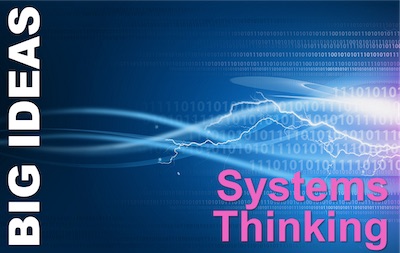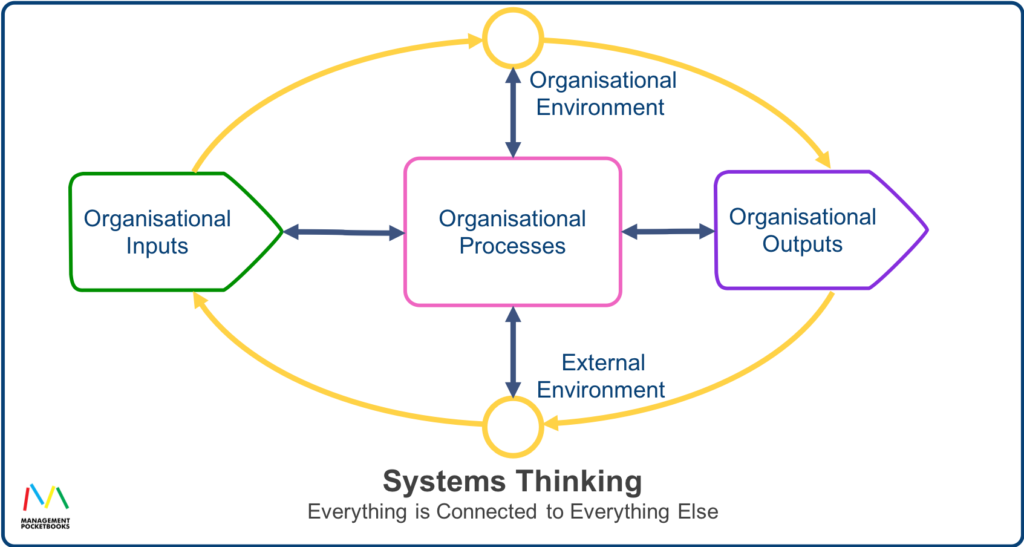
 Systems thinking is a big idea that’s remarkably… simple.
Systems thinking is a big idea that’s remarkably… simple.
It’s a simple idea about complex phenomena. And the principle virtue of systems thinking is that it reminds us that the real world is far from simple.
Indeed, when we try to apply simple solutions to complex problems, the solution tends to fail: often spectacularly. And it’s systems thinking that points us in the right direction. We need to think about the whole messy, complex, inter-connected system, if we are to have any chance of finding a solution that makes our problem better.
If only politicians could grasp this simple fact.
Why Do We Need Systems Thinking?
The world is a complex place, and so are modern businesses and public services. The managers and leaders who keep them ticking over face challenges that they cannot solve with simplistic thinking.
‘This is what’s wrong, so if we fix it, we have solved the problem.’
This kind of thinking rarely works on all but the simplest problems. Instead, what we see are complex webs of causes and effects – often circling back on themselves. These loops (or ‘feedback loops’) mean that changing one thing causes other changes that can either:
- amplify the effects of our intervention, or
- dampen the effects
This means that changing something by a certain amount can have unpredictable impacts on other things. Controls and outcomes are related in a non-linear way.

Systems thinking seeks to understand the complexity and model all of the inter-connections. If we do this well, we can have a deeper understanding of the implications of our choices. But the primary benefit is to be alert for these kinds of feedbacks and non-linear effects.
Put simply, systems thinking is a way to handle the ‘law of unexpected consequences’. We may still not be able to model a system accurately enough to foresee all the consequences of our actions. But at least we can anticipate that some of the consequences may take us by surprise.
What is Systems Thinking?
Systems thinking encompasses a lot of different ideas, models, and disciplines. For example, it draws from:
- critical phenomena
- self-organisation
- cybernetics
- non-linear behaviours
- Feedback and equilibrium
All of this is very well. It’s important if you plan to study systems thinking in depth. But, for our purposes, let’s go for a simple definition.
There are a large number of definitions out there, so let me offer one that captures the essence of most of them…
Definition of Systems Thinking
System thinking is a way of thinking that sees how everything is interconnected, and that all parts of a system can affect every other part.
If we analyse the relationships between the system’s parts, we can better understand the effects of an intervention.
This sets us up for better decision-making.
How to Get Started with Systems Thinking
Avoid jumping to simple conclusions. The simplest is that the problem has one simple cause.
Instead, start by trying to map out every component of the system concerned. Especially focus on the parts that other people seem to be ignoring, and try to figure out how they connect to the parts you initially thought were central. A great question to ask is:
‘What parts of this problem do we not understand?’
The Iceberg
Systems thinking has the concept of ‘the iceberg’. This uses the metaphor of an iceberg to highlight that a large part of a problem is probably hidden from plain sight – ‘below the waterline’. And the path an iceberg follows is not dictated by the wind on the part we can see, but by the hidden ocean currents working on the bits we cannot. This is also true of complex systems. The drivers for visible outcomes are often hidden in the complexity.
Diversity
Also, don’t assume that everyone has the same picture of how things work, the same mental model, or even the same information. Instead, gather all of the different perspectives, so you have the best possible understanding on which to base your decisions. In our Wisdom of the Crowd article, we talked about the value of having a diverse group working on a problem or making a decision. Here is a great place to apply that insight.
Eschew Easy Answers
When you hear people offer easy answers, you’ll know you are in danger. The most dangerous phrase you’ll hear from someone trying to improve a complex system or fix a fiendish problem is:
‘All we have to do is…’
Now’s the time to say ‘No’. Complex feedback loops will usually lead to unwanted consequences. And that’s why we need systems thinking.
What is Your experience of Systems Thinking?
We’d love to hear your experiences, ideas, and questions. Please leave them in the comments below.
To learn more…
The Thinker’s Pocketbook is full of tips, techniques, and tools to expand your portfolio of thinking skills and improve your mental agility.
